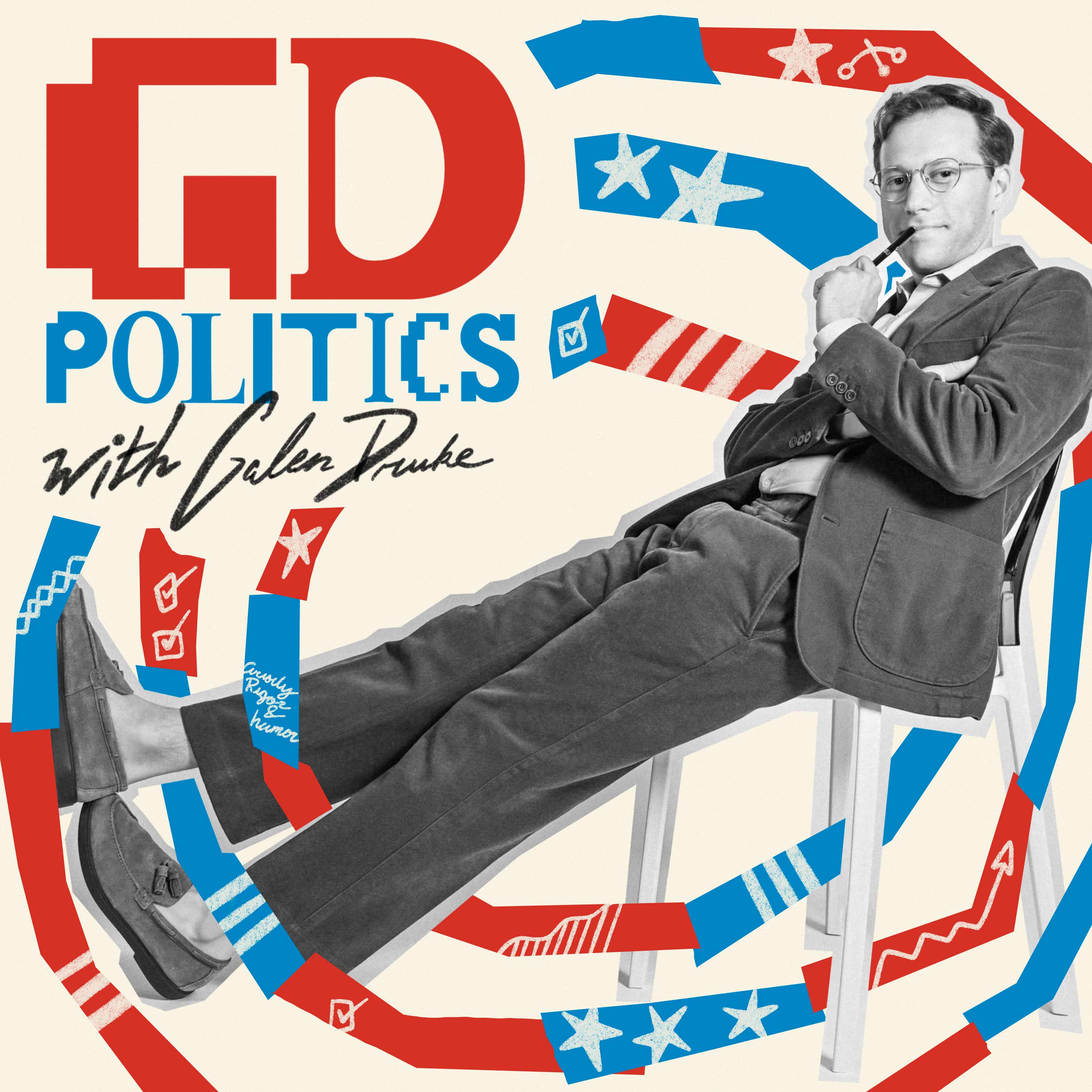

GD POLITICS
Galen Druke
Making sense of politics and the world with curiosity, rigor, and a sense of humor. www.gdpolitics.com
Episodes
Mentioned books

Dec 23, 2025 • 5min
'Roman Empire' Elections Part 2
In this engaging discussion, Jacob Rubashkin, a political election expert, and Leah Askarinam dive deep into quirky historical elections. They reveal the bizarre nomination of Andrew Johnson in 1864, who infamously took his oath while drunk. The conversation also highlights the unique case of a deceased candidate winning a Senate race and speculates on how the political landscape might differ had Mitt Romney secured the presidency in 2012. A fascinating mix of humor and political insight awaits!

Dec 22, 2025 • 44min
'Roman Empire' Elections Part 1
Join Leah Askarinam from the Associated Press, who brings her insights on election stories, and Jacob Rubashkin from Inside Elections, a historical analysis expert. They dive into the peculiar meme linking men and their thoughts on the Roman Empire, drawing parallels with today's political obsessions. Jacob relives the chaotic 2000 Florida recount, while Leah explores how small races shape impressive political trajectories. They dissect notable elections and their lasting impacts, including Florida's recent primary and the domino effect leading to impactful political figures.

Dec 18, 2025 • 23min
Is Venezuela The Next Iraq?
Michael O'Hanlon, a defense policy expert at the Brookings Institution, discusses the escalating tensions between the U.S. and Venezuela. He argues that recent military actions might legally amount to war, while noting that outright invasion is unlikely. O'Hanlon situates these developments within the historical Monroe Doctrine, addressing Trump's motivations in targeting Maduro. He emphasizes the need for congressional debate on military intervention and cautions against using economic interests as a justification for conflict.

Dec 15, 2025 • 52min
The Obamacare Subsidy Cliff Is Here
Mary Radcliffe, Head of Research at FiftyPlusOne, and Nathaniel Rakich, Managing Editor at VoteBeat, discuss the urgent healthcare challenges posed by the looming expiration of enhanced ACA subsidies. They delve into public opinion on healthcare, revealing a surprising rise in ACA approval. The duo analyses the implications of potential premium spikes and bipartisan legislative efforts. Additionally, they explore the political repercussions of rising healthcare costs and assess whether Trump's low approval ratings could shape future elections.

Dec 11, 2025 • 23min
Can Any Democrat Flip Texas?
Jacob Rubashkin, Deputy Editor at Inside Elections, dives into the fiery Texas Senate primary featuring Democratic Rep. Jasmine Crockett. He assesses her controversial candidacy and its potential to flip Texas amidst a charged political environment. The discussion also reveals insights on the impact of GOP nominees and contrasts Crockett's strategy with that of fellow candidate Tallarico. Additionally, they explore lessons from past Texas races and the dynamics shaping key Senate contests across the nation.

15 snips
Dec 8, 2025 • 1h 8min
How The UK Became Ungovernable
Helen Thompson, a political economy professor at Cambridge and author, teams up with David Runciman, an honorary politics professor and seasoned podcaster, to unravel the chaos within British politics. They discuss the stagnating UK economy, regional inequalities, and the fracturing party system post-Brexit. The pair critiques Keir Starmer's unpopularity and the political ramifications of the recent budget. They explore the rise of the populist Right and the complexities of UK–US relations, blending economic insights with biting political analysis.

Dec 4, 2025 • 13min
Is America Really 11 Nations?
Colin Woodard, Director of the Nationhood Lab and acclaimed author, discusses his research on regional cultures in America. He argues that the U.S. is a federation of distinct cultural ‘nations’ shaped by historical settlement patterns. Woodard delves into how these cultures affect modern issues like voting, health, and gun violence. He examines the continuing influence of colonial backgrounds, the impact of migration on regional identities, and highlights the divide between individualistic and communitarian values in contemporary society.

13 snips
Dec 1, 2025 • 58min
Celebrity Politicians, Dummymandering, And The Texas Primary
Lenny Bronner, a data scientist at The Washington Post, joins to delve into the unique intersection of celebrity and politics. They explore the potential shift to ranked choice voting for Democrats in 2028 and how it could reshape primaries. Discussions also reveal the dynamics of the Texas Senate race, with insights into how celebrity status might influence electoral success. Lenny highlights the impact of gerrymandering and the challenges facing potential candidates like Roy Cooper and Andy Beshear. Expect intriguing analysis and lively banter!

11 snips
Nov 24, 2025 • 55min
Mamdani Is In, Marjorie Is Out
Mary Radcliffe, Head of research at FiftyPlusOne, and Nathaniel Rakich, Managing editor at Votebeat, dive into the intriguing political dynamics following Trump's warm meeting with NYC mayor-elect Zohran Mamdani. They dissect the implications of Marjorie Taylor Greene's resignation and its potential reflection of GOP divisions. The conversation shifts to the recent federal ruling blocking Texas’s gerrymandered map, exploring how it might affect party dynamics. They also touch on quirky cultural trends like the 'cousin walk' pre-Thanksgiving marijuana ritual.

Nov 20, 2025 • 33min
How AI Could Upend American Politics
David Beiler, a public opinion researcher and former data journalist at The Washington Post, delves into AI's profound impact on American politics. He highlights the widespread skepticism about AI across party lines and discusses the unique pyramid model of voter and elite attitudes. The conversation explores potential Democratic strategies around transparency and taxation of AI gains. They also dissect whether AI is causing job losses or merely reflecting post-pandemic trends, raising concerns about a future political crisis driven by AI's pervasive influence.


